I could install an antenna myself. Why should I get Tech Unbound to do it for me?
We see many do-it-yourself installations that have gone awry. Dangerous and precarious mountings, cheap quality antennas, incorrect wiring, insufficient grounding. We have seen people who have either done a DIY install or hired a questionable installer who have had damage done to their brick or roof, or even had a static electricity surge damage every TV in their home! We guarantee that we will mount in the most solid and safe location possible, with accurate aiming for optimal signal, correct wiring to multiple rooms in your home or business, with proper grounding to improve your signal and protect your electronics.
What makes Tech Unbound different than other installers?
Having been in this business since 2006, we have perfected the art of safely and accurately installing and aiming your antenna for optimal signal. We have built our own kit to measure your signal, and no other installer has anything that compares to it. You can see it in action when we do your free site survey!
We also offer 1 year warranty on parts and labour, and 3 months incidental aim warranty. If anything goes wrong with your antenna system, just call or e-mail us and we will come and diagnose and fix your problem. If you are within the warranty period, you pay nothing! After the warranty period, you pay a nominal fee for our visit, and for any replacement parts required. Most of the time, we have a replacement item with us when we visit you, so we are able to replace it on the spot!
We have liability insurance, which means that if we were ever to make a mistake that causes damage to your home or property, we are covered.
This is our full-time job. We are a family business that relies on word-of-mouth, so we do our very best to support our customers, and we stand by our work and our products. You will always be able to reach us.
What kind of customers do you serve?
All kinds of customers! We have done small jobs like a simple antenna going into a trailer to a single small TV. We have installed in homes of all sizes, for people of all ages, in modest and affluent communities and everything in between. We have installed antenna systems in homes, gyms, restaurants, retail stores, medical offices, B&Bs, and even a rooming house where we ran extensions to 28 rooms on multiple floors! We have also installed security camera systems and done TV wall mounting for homes and businesses all over southwestern Ontario. One dental office even had us mount TV sets on the ceiling above its dental chairs so patients could watch TV during their cleanings! Really, no job is too big or too small for us.
What is the best antenna available? Why are there so many different types of antennas?
Every model of antenna has different properties, and there is no one antenna that is best for every situation.
Sensitivity – If you live in a rural area, a more sensitive antenna would be desirable, but in a city a very sensitive antenna will pick up interference from sources like cell phone towers and your neighbours’ WiFi. Also, the farther you are from the transmission source you wish to receive, the more sensitive antenna you will require.
Durability – Some antennas are stronger than others. Strength is a good thing, but some models lose sensitivity by focusing on designing a more durable structure. Still other antennas are extremely sensitive, but they are flimsy and quickly bend out of shape in the wind. When an antenna loses its shape, it sensitivity decreases significantly.
Directionality – Some antennas are omnidirectional, meaning they receive signals equally from all directions. This type of antenna is not very sensitive, and will only pick up channels transmitted from nearby. They are most useful for boats, as you can’t aim an antenna that is mounted on a moving vessel. Some antennas are directional, meaning you have to point them at the transmitter in order to receive channels. Generally, the more sensitive the antenna, the more directional it is, so a difference of 2 or 3 degrees rotation can make a huge difference to how many channels you receive. Also, antennas can be unidirectional (the whole antenna points the same direction) or bidirectional (the antenna panels can be pointed in different directions), and each has different models and applications.
Can I buy my own antenna and have you install it?
Yes, but we don’t recommend it. Firstly you may not choose an appropriate equipment for your situation. We can advise you on a suitable combination of antenna, amplifier, and mounting hardware. Secondly, if you buy your own equipment, you are responsible for your own warranty. We will warranty our work, so if something goes wrong with our aim we will return to repair it, but if your equipment is faulty and you didn’t buy it from us, you will need to pay us if you want us to take it down and/or put it back up. You would also be without an antenna while you take your equipment back to the store and have it exchanged. When you buy from us directly, you pay nothing for any repairs done within the first year, and most of the time we are able to replace the item on the spot so you can get back to watching TV.
Do your recommend a rotor?
No. Rotors are outdated technology, and are detrimental for a number of reasons.
First, modern digital antennas are extremely directional. They need to be aimed very accurately. Rotors were designed back in the days of analog signal, so rotating the antenna away and then back to *almost* the same direction was good enough. They are simply not accurate enough for digital TV reception.
Second, rotors were OK in the days when people would hook up only one TV to the antenna. Today, most people hook up multiple televisions to the same antenna, and if one person rotates the antenna to receive one channel and another person wants to watch a different channel on another TV, they may not be able to get what they want. When we install your antenna, we aim it so it receives the very best signal and largest number of channels available, and then we lock it in place so you will always have the best reception.
Third, rotors were designed to be water resistant, but after 15 or 20 freeze and thaw cycles, the rubber seals deteriorate and leak. Thirty years ago there was only 1 or 2 freeze and thaw cycles per year, so a rotor could last well over a decade. Now, we have 4 or 5 cycles per year, so the seals wear out quickly. When water gets inside the rotor case, it can corrode the motor. When that water freezes, it expands and distorts things and the rotor ends up seizing so it no longer moves.
What about installing my antenna in my attic?
This is not advised. The main problem is that while a roof is mostly transparent to television signals, water is not. When your roof is wet, it becomes a giant mirror and reflects the signal away, so your reception will be terrible. Also, there is very little space inside an attic, so it is difficult to mount and aim an antenna. If you are concerned about the look of an antenna on the outside of your house, ask us about models that are smaller and less obtrusive. We will also look for a way to mount your antenna so it is not as visible.
Do I need a “booster” or amplifier?
Again, this depends on your location. In Toronto, amplification is not necessary as the signal from both the CN tower and Buffalo are very strong. The farther you get from Toronto, the weaker the signal gets, so you may require a larger antenna and/or an amplifier. When we do a site survey, we test your signal to determine what type of antenna you need and whether you require an amplifier.
There are different types of amplifiers. A pre-amplifier is used to increase the signal when reception is weak.It is mounted up on the pole right below the antenna, and it receives power through the same coaxial cable that carries the signal into your house. There are different strengths of amplifiers as well. This is because sometimes you need to increase the signal, but if you amplify too much it also increases any interference and will reduce your signal quality. The amplifiers we use have an integrated LTE filter, which reduces interference from cell phone towers.
In instances where the antenna signal is to be sent to more than 4 televisions, a distribution amplifier is necessary. This device is used instead of a splitter, and increases the signal going to each extension to ensure strong signal to every room. In most cases this type of amplifier is not necessary.
How high does the antenna need to be? How will you mount it?
Since radio signals work on line-of-sight, you only need to have the antenna up high enough to clear local obstacles like your neighbours’ rooves. Generally, trees are not a problem unless they are very large and very close to the antenna, or if you have a very tall, dense forest close to you in the direction of the transmitter. For most people, the antenna can be mounted either just above or just below the roof line.
Whenever possible, we don’t mount on the roof. This is because in winter, it is impossible to access an antenna that is on a roof, so if it needs repair you would have to wait until spring. Also, a roof is made of very thin plywood, so any screws put into it can easily pull out and leave you with open holes in your roof. Instead, we have several other methods of mounting an antenna.
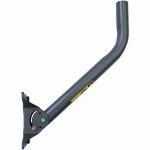 J-Pole – This is mounted using large screws going into brick on a wall or chimney. An extension pole is placed into the end of the J-pole so the antenna can be manually rotated for aiming and then fixed into place using a cross screw. In some cases, side support arms are added for stability.
J-Pole – This is mounted using large screws going into brick on a wall or chimney. An extension pole is placed into the end of the J-pole so the antenna can be manually rotated for aiming and then fixed into place using a cross screw. In some cases, side support arms are added for stability.
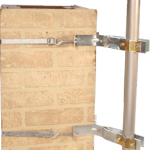
Chimney Straps – This is a way to attach an antenna pole to a chimney without screws. This is recommended for chimneys where the brick may be damaged or loose. It is a strong mount, but it does tend to loosen over time and may need to be tightened after a few years.
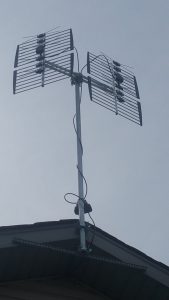
Gable Mount – A cross bar attached across a gable, with another attachment point near the point at the top.
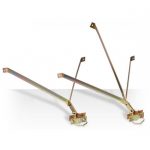
Y-Mount – Used for attaching a very long pole, or in cases where there the eaves have a very large overhang. These brackets are attached to the wall with large screws.
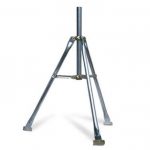
Tripod – Mostly used on flat rooves, such as on a commercial building. Sometimes also used on a balcony of an apartment building.
Will the antenna attract lightning?
It is extremely unusual for an antenna to be hit by lightning. This is because in residential areas, the lampposts on the streets act as lightning rods for the neighbourhood. They are very heavily grounded, so lightning is attracted to them as the path of least resistance. In rural areas, lightning roads are used to protect homes from lightning strikes. Grounding an antenna is not for protection against direct lightning strikes. It is actually to protect from static discharge that comes from a nearby lightning strike, or from wind blowing through the antenna. Grounding also helps to remove interference from cell phone towers, WiFi signals, and other sources.
Is it possible to install an antenna in an apartment or condo?
In many cases, yes. It largely depends on the direction your balcony or windows face and how high up you are from the ground level. If you live in a condo, you should check with your condo association to find out if an antenna is allowed.
Is it possible to install an antenna on a trailer or cottage?
Yes, provided it is in an area where signal can be received. Contact us to find out if reception is available in your area. In the case of a trailer, if it is in a fixed location and is not moved around, then it is possible to use an antenna there.
What is your service area?
We are based in Kitchener, Ontario but we service as far east as Oshawa, as far north as East Gwillimbury, as far west as Stratford and Woodstock, and as far south as Simcoe, Hamilton, and Niagara, as well as all areas in between including downtown Toronto.
Do you have evening and weekend appointments?
Yes! In fact, most of our work is done on evenings and weekends because it is when most of our customers are available. We also have weekday appointments available during the afternoons. We also have large work lights to allow us to work safely after dark during the winter months.
Do you work year round?
Yes! Provided conditions are safe, we work in all seasons. We will work unless there is a risk of lightning, high wind, heavy rain, extreme heat or cold, or extreme ice conditions.



